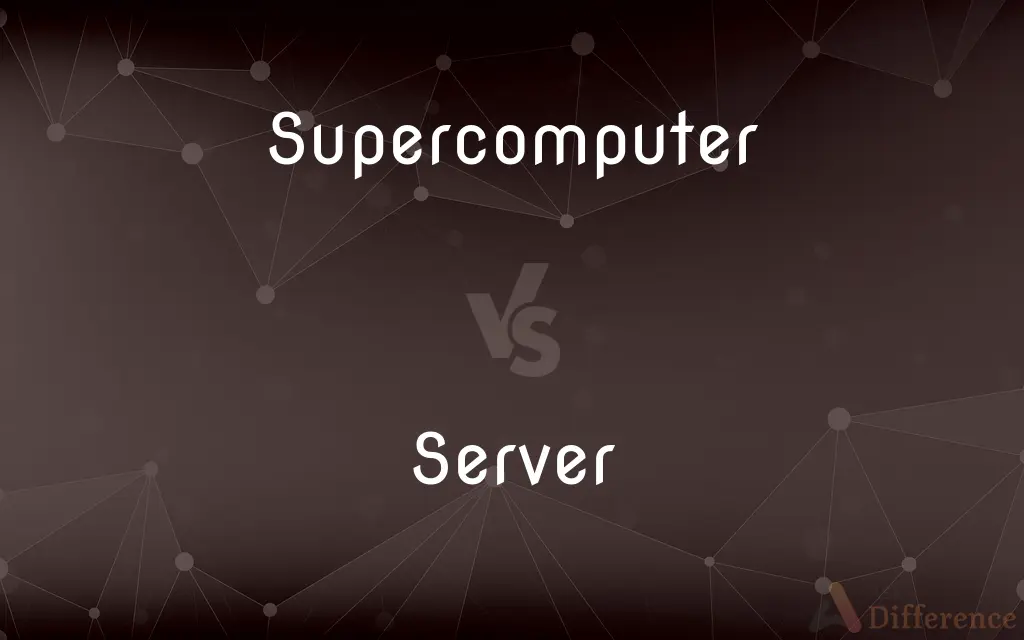Supercomputer vs. Server — What's the Difference?
By Maham Liaqat & Urooj Arif — Updated on March 12, 2024
A supercomputer is a high-performance computing system designed for complex simulations and calculations, while a server is a system that provides resources, data, or services to other computers over a network.

Difference Between Supercomputer and Server
Table of Contents
ADVERTISEMENT
Key Differences
A supercomputer is a powerful computing system capable of processing vast amounts of data at very high speeds, making it essential for tasks that require extensive calculations, such as climate research, quantum physics simulations, and complex scientific computations. On the other hand, a server is a computer system or device that manages network resources and provides services like data storage, web hosting, or email services to client computers within a network.
While supercomputers are built with cutting-edge technology to maximize processing power and speed, often occupying large spaces with specialized cooling systems to manage heat generated by their operations, servers are designed for reliability, availability, and efficient management of network resources. Supercomputers are typically used in specialized research institutions, government agencies, and academic settings for tasks that push the boundaries of computational capabilities, whereas servers are ubiquitous in both corporate and personal network environments, supporting the day-to-day operations of businesses and internet services.
The architecture of a supercomputer involves thousands of processors working in parallel, connected by a high-speed networking infrastructure to synchronize computations and data sharing. This contrasts with servers, which might operate on a smaller scale, focusing on optimizing resource allocation, data retrieval, and service provision to multiple clients. The complexity and cost of supercomputers limit their accessibility and use to specific, high-impact computational challenges, while servers are an essential component of modern IT infrastructure, supporting a wide range of services and applications critical to organizational and internet functions.
Despite their differences, both supercomputers and servers play crucial roles in their respective domains. Supercomputers enable breakthroughs in scientific research and complex problem-solving, while servers maintain the backbone of networked services and communications, highlighting the diverse capabilities and functions of advanced computing systems in addressing various needs and challenges.
Comparison Chart
Primary Function
Performs highly complex and large-scale computations.
Provides resources, data, and services to other computers over a network.
ADVERTISEMENT
Use Cases
Scientific research, climate modeling, simulations in physics.
Web hosting, file storage, email services, database management.
Processing Power
Extremely high, with the capability for quadrillions of calculations per second.
Varies widely, tailored to the specific needs of the network services it provides.
Architecture
Thousands of processors working in parallel, high-speed networking infrastructure.
Can range from a single processor to multiple processors, optimized for resource management and service provision.
Environment
Specialized research institutions, government agencies, academic settings.
Ubiquitous across corporate, personal, and internet infrastructure environments.
Compare with Definitions
Supercomputer
A high-performance computing system for complex simulations.
Supercomputers are used to model global climate patterns.
Server
A system providing network resources or services.
The company's email server manages all internal and external communications.
Supercomputer
Designed for tasks requiring massive computational power.
A supercomputer processed data from the Large Hadron Collider experiment.
Server
Integral to network functioning and data accessibility.
The file server stores and shares documents within the organization.
Supercomputer
Utilizes parallel processing for efficiency.
The latest supercomputer uses thousands of processors to perform simultaneous calculations.
Server
Ranges from powerful machines to modest hardware.
Small businesses may use a simple server for file sharing and printing services.
Supercomputer
Occupies large spaces with specialized cooling systems.
The data center houses a supercomputer with an advanced liquid cooling system.
Server
Can host high-traffic websites.
A dedicated server hosts the e-commerce platform to ensure smooth user experience.
Supercomputer
Essential for advanced scientific research.
Researchers used a supercomputer to simulate protein folding for drug discovery.
Server
Supports day-to-day operations of businesses and internet services.
The web server ensures the company website is accessible 24/7.
Supercomputer
A supercomputer is a computer with a high level of performance as compared to a general-purpose computer. The performance of a supercomputer is commonly measured in floating-point operations per second (FLOPS) instead of million instructions per second (MIPS).
Server
One who serves food and drink. See Usage Note at waiter.
Supercomputer
A mainframe computer that is among the largest, fastest, or most powerful of those available at a given time.
Server
Something, such as a tray, that is used in serving food and drink.
Supercomputer
(computing) Any computer that has a far greater processing power than others of its generation; typically they use more than one core and are housed in large clean rooms with high air flow to permit cooling. Typical uses are weather forecasting, nuclear and other natural science simulations, advanced mathematics and animations.
Server
An altar server.
Supercomputer
A mainframe computer that is one of the most powerful available at a given time
Server
(Law) One who serves a legal process, such as a summons or court order.
Server
(Sports) The player who serves, as in court games.
Server
A file server.
Server
A computer that processes requests for HTML and other documents that are components of webpages.
Server
(computing) A program that provides services to other programs or devices, either in the same computer or over a computer network.
Server
(computing) A computer dedicated to running such programs.
Server
One who serves.
Server
A waitress or waiter.
Server
The player who serves the ball.
Server
(Christianity) A priest's attendant at the celebration of the Eucharist.
Server
A tray for dishes.
Server
A spoon for serving food.
Server
One who serves.
Server
A tray for dishes; a salver.
Server
A person whose occupation is to serve at table (as in a restaurant)
Server
(court games) the player who serves to start a point
Server
(computer science) a computer that provides client stations with access to files and printers as shared resources to a computer network
Server
Utensil used in serving food or drink
Common Curiosities
What are common use cases for servers?
Servers are used for web hosting, file and data storage, email services, and running applications or databases for network clients.
What is a supercomputer?
A supercomputer is a highly advanced computing system designed for performing complex and large-scale computations, often used in scientific research and simulations.
What makes supercomputers so powerful?
Supercomputers' power comes from their architecture, which involves thousands of processors working in parallel, enabling them to perform quadrillions of calculations per second.
How are servers integral to internet functionality?
Servers host websites, manage emails, and store data, making them essential for providing the content and services accessed via the internet.
How do supercomputers and servers differ in their primary functions?
Supercomputers are focused on executing highly complex calculations at high speeds, while servers manage and provide network resources and services.
What are the environmental requirements for supercomputers?
Supercomputers require specialized environments with advanced cooling systems to manage the heat generated by their intensive operations.
How do the processing capabilities of servers vary?
Servers' processing capabilities can vary widely, from modest hardware for small networks to powerful machines for large-scale data management and web services.
What is a server?
A server is a computer system or device that provides data, resources, or services to other computers, known as clients, over a network.
Are supercomputers accessible to the general public?
Generally, supercomputers are not accessible to the public due to their cost and the specialized nature of their applications.
Can a supercomputer be used as a server?
While technically possible, using a supercomputer as a server would be impractical and inefficient given its design and cost for high-performance computations.
Can servers support multiple services at once?
Yes, servers can be configured to provide multiple services simultaneously, such as hosting a website and managing a database.
What is the significance of parallel processing in supercomputers?
Parallel processing allows supercomputers to perform multiple calculations simultaneously, significantly speeding up complex computational tasks.
Why are supercomputers used in scientific research?
Supercomputers can process and analyze vast datasets quickly, making them invaluable for simulations, modeling, and complex calculations in scientific research.
How do servers support business operations?
Servers support business operations by hosting applications, storing and managing data, and providing various services essential for daily activities.
What are the key factors in choosing a server for a business?
Key factors include the specific needs of the business, such as the scale of operations, the type of services needed, reliability, and budget constraints.
Share Your Discovery

Previous Comparison
Shade vs. Ghost
Next Comparison
Lead vs. PewterAuthor Spotlight
Written by
Maham LiaqatCo-written by
Urooj ArifUrooj is a skilled content writer at Ask Difference, known for her exceptional ability to simplify complex topics into engaging and informative content. With a passion for research and a flair for clear, concise writing, she consistently delivers articles that resonate with our diverse audience.














































